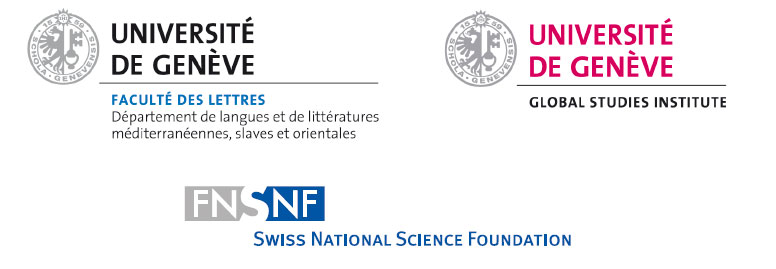
CALL FOR PAPERS
International Conference
Geneva, 13-14 December 2018
Divided Memories, Shared Memories
Poland, Russia, Ukraine: History Mirrored in Literature and Cinema
In Central and Eastern European countries, memorial questions appeared right after the demise of the communist regimes in 1989–1991, revealing long-denied processes. The phenomenon of the rise of repressed memories along with the rewriting of history, and the political uses of the past are noticeable in Poland, Russia, and Ukraine, three countries whose histories are as often shared as their memories are divided. The ‘memory wars’ in which these three states have sometimes been engaged since the end of the 1980s have been the subject of an abundant historiography. However, research has often focused on the analysis of memorial issues after 1989–91, while the paradigms of the communist era continue to be felt in these three countries. Above all, these works, no matter the field of study, be it political science, sociology, anthropology, or history – do not take enough advantage of the invaluable resources that are literature and cinema.
Literature and cinema are powerful means of promoting representations of the past and play a central role in shaping national identities. At the time of Communism, the political authorities were well aware of the power of literature. This is evidenced by the political scandal that broke out in 1968 after the publication of the novel A Cathedral by Oles Honchar, even though the writer’s way of describing Ukrainian national traditions was limited to the Soviet canon and literary standards of ‘socialist realism’. It is also evidenced by the silence on Vasily Grossman’s texts, Life and Fate, as well as Everything Flows, a novel written between 1955 and 1963, in which a man just released from the Gulag mentions the Great Famine in Ukraine, a taboo subject in the USSR until the late 1980s. In socialist Poland, the war crimes of the Ukrainian nationalist underground against the Polish population were never silenced, but the largest-scale massacre that occurred in the Volhynia region in 1943 (that would become part of the Soviet Ukraine after the war) was hidden. The state’s attempt to impose an official version of history through literature explains the importance of both Soviet samizdat and Polish drugi obieg.
In the same way as literature, cinema – ‘the most important of all’ according to the well-known Soviet slogan – played a fundamental role in promoting an official vision of history throughout the 20th century, as shown, for instance, in the Soviet movies of Igor Savchenko (The Horsemen, 1939, Bogdan Khmelnitsky, 1941), that accompanied Stalinist expansionism in Ukraine. Today, the great variety of Russian, Polish, and Ukrainian movies is not limited to state propaganda. Moreover, a number of themes crystallize the divergences from one country to another, for instance the Cossack theme (With Fire and Sword, Jerzy Hoffman, Poland, 1999; Bohdan-Zinoviy Khmelnytsky, Mykola Mashchenko, Ukraine, 2008; Taras Bulba, Vladimir Bortko, Russia, 2009). Finally, cinema is also used to reflect on national traumas (as, for example, in Katyń by Andrzej Wajda, Poland, 2007, or in Haytarma by Akhtem Seitablayev, 2013, the first Crimean Tatar movie about the Soviet deportation of 1944).
Representations of events and historical figures that have had a resonance in Russia, Poland, and Ukraine in the literature and cinema of the 20th and 21st centuries, will be the subject of the multidisciplinary and international conference that will be held at the University of Geneva in December 2018.
- Objects of analysis. We will focus on the representations of historical events and figures that have been the subject of conflicting historical narratives in at least two of the three countries in the 20th century literary productions (novels, short stories, historical biographies for the general public, etc.) and cinematographic works (not only auteur movies, but also mass production for propaganda or commercial purpose) of Poland, Ukraine, and Russia.
- Our attention will not be only focused on conflicts. Indeed, a particular attention will be paid to literature and cinema as possible fields of historical dialog, and of Polish, Ukrainian, and Russian reconciliation. We will try to assess if convergent interpretations (generally less obvious to identify than ‘memory wars’) have emerged in the literature and cinema of these three countries around some historical events or figures. We will also try to see whether – before the collapse of the communist regimes, or afterwards, throughout a century marked by abrupt political changes and periods of (relative) political and diplomatic stabilizations – literature and cinema have only contributed to the writing of ‘closed’ national narratives or if they have also taken part in the development of a shared memory.
We are open to submissions of proposals from scholars of history, culture, politics, literary studies, and other related disciplines. Interdisciplinary and comparative papers are also welcome. We are waiting for proposals on books and writers, movies and moviemakers that will not focus only on literature and cinematographic criticism, or on the historical context itself, but that will also investigate the conditions in which literary and cinematographic productions dealing with representations of the common past in Poland, Russia, and Ukraine were created.
Proposals should include the title of the presentation, an abstract (around 300 words), a brief resume (one page), and contact details (e-mail address, postal address, phone number). Proposals should be sent to GenevaDecember2018Conference@yahoo.com by April 30, 2018.
Should a proposal be accepted, accommodation and travel costs will be covered.
Organizer: University of Geneva (Global Studies Institute and Faculty of Arts, Russian Department). The Conference is organized in the frame of the Project: Divided memories, shared memories. Ukraine / Russia / Poland (20th-21st centuries): an entangled history, supported by the Swiss National Science Foundation.
Organizing committee: Korine Amacher (Geneva), Eric Aunoble (Geneva), Andrii Portnov (Berlin / Frankfurt/Oder)
Keynote speakers: Rory Finnin (Cambridge University), Susanne K. Frank (Humboldt University Berlin)
Date: December 13-14, 2018
Conference language: English
Publication: 2019

